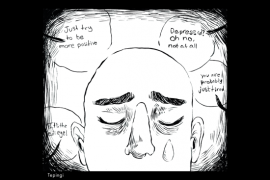Anxiety is a serious problem that many of us have but don’t realize. Find out how to spot anxiety and what to do about it.

Are you the type of person that tends to over think and over plan? When starting a new project or going through a life change, does this consume your thought? Do you make checklists and schedules in your head before you sleep of all the things you need to get done? I am one of those people. My whole adult life I just assumed that this was the kind of person I am and because of these things I am more efficient and achieve everything I set out to do. However, I have recently discovered that many of these symptoms are signs of anxiety. These traits to over-plan and over think are signs of anxiety when they take a more extreme form. When everyday plans and goals start causing mental distress and in some cases even prevent a person from being fully functional, this person likely has anxiety.
Psychological issues are still a very unspoken-about territory in our society. Many of us know one or two people that we suspect have psychological issues that they either ignore or are in denial about. It’s never an easy topic to approach and having a psychological issue or seeking professional help is most of the time seen as something extreme. Anxiety is one of the most common psychological issues that are often overlooked or undermined resulting in an escalation of the condition to a more severe state.
General Anxiety disorder (GAD) is when you find yourself worrying about everyday things in your life such as work, family, or money for no apparent reason. People with GAD tend to overthink on how certain scenarios could play out and all the bad things that could happen when most of the possible scenarios are unrealistic or very unlikely to occur. Some of the more common symptoms of GAD are excessive worrying, irritability, trouble sleeping, indigestion, gastric issues, headaches and an increased heart rate. It is unclear why anxiety develops in some people but factors such as traumatic events, death of a loved one, divorce or just a period of high stress can all be triggers.
According to Dr. Shankar Srinivas Kuchibatla, consultant psychiatrist and medical director of the Dubai-based Lifeworks Foundation, approximately 20 percent of the UAE population suffers from some form of anxiety disorder. Our fast-paced lives, long work hours and constant social demands are all factors that overwhelm many of us. When we aren’t worrying about our own lives, we log into our social media accounts and are exposed to an endless stream of political news, environmental problems, or disturbing YouTube videos. This constant stream of information can do more damage than good for a lot of people.
A common misconception is that if a person can function normally throughout their day, it’s unlikely that they have a serious problem, allowing their underlying issues to escalate. Psychological issues like anxiety are a chemical imbalance in the brain that can happen to anyone at any point in their lives and can vary and manifest differently from one person to another. Determining if you are just a little stressed or if you have a problem is the first step to finding a solution that suits you.
From my personal experience, the best way to understand what is going on in your head is to talk about it. We are not alone, there is always a family member, a friend or even a professional who can help us process our thoughts and feelings. Educating ourselves on this disorder and others that are on the rise helps us become better equipped to identify if we or someone we love, fit the profile. Psychological diseases are as real and life-altering as physical diseases, the sooner we accept this, the more people we can help.
References:
- Jr., B. D. (2017, April 10). UAE Residents Gripped by Anxiety Disorders. Retrieved from Khaleej Times: http://www.khaleejtimes.com/news/uae-health/uae-residents-gripped-by-anxiety-disorders
- WebMD. (2016, Feburary 27). General Anxiety Disorder . Retrieved from WebMD : http://www.webmd.com/anxiety-panic/guide/generalized-anxiety-disorder#1




The conditions described in this post are so familiar to me. Overthinking, worrying, over planning and negative thinking follow me almost every day. I learn to manage anxiety and panic attacks and yoga is the tool that helps me much.
I have pleased to read about anxiety. You know I was searching Google to find something important like this reading. Thanks and keep posting things like this.
It's really interesting to read about the Modern Epidemic! I ave pleased to read the entirety of the post with lots of detail. Thank you so much and keep posting things like this.